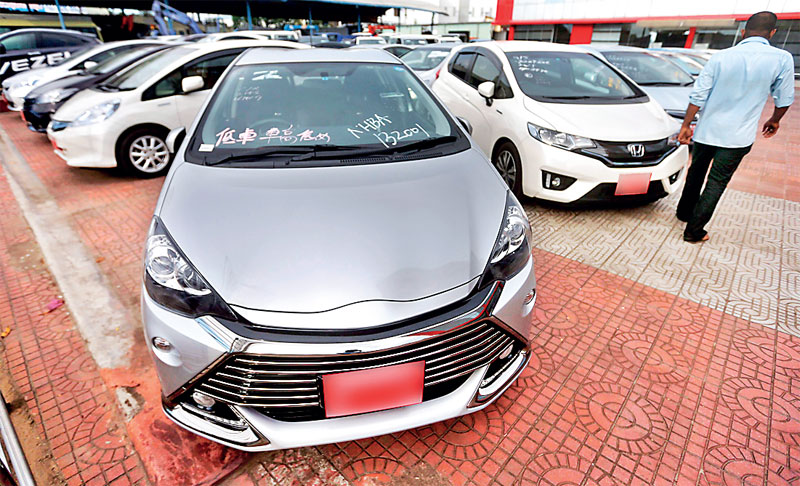Wednesday Mar 04, 2026
Wednesday Mar 04, 2026
Thursday, 11 November 2021 03:10 - - {{hitsCtrl.values.hits}}

|
Finance Minister Basil Rajapaksa
|
Vehicle importers are looking for a lifeline from the 2022 Budget to be presented tomorrow, having given credible and practical win-win proposals for consideration by Finance Minister Basil Rajapaksa.
Proposals by the Vehicle Importers Association of Sri Lanka (VIASL) stem from the fact that the industry has been at a near standstill with the ban on imports for the past two years.
“The main objective of these proposals is to develop the motor vehicle industry, increase the Government revenue and to provide an opportunity to the community to purchase a quality vehicle at a reasonable price,” VIASL said.
“Even though various official requests have been made to the Minister of Finance to provide us with an audience to discuss our issues and to take our suggestions on board to overcome this situation, so far we have not been given the opportunity. As evident from incidents around us, failure to consult industry experts on respective matters is a fundamental weakness of this administration.”
It alleged that the Government had been carrying out various “divergent tactics” from time to time to control the frustration of the general public and vehicle importers.
“Last year the Government announced that the importation would be reviewed in December and then, in March this year, they announced that they were considering a quota system for vehicle importation. At present, they are making statements regarding a scheme in which local taxes could be paid in foreign exchange and vehicles to be imported without a foreign exchange outflow. Hence it is simply evident that this is again another strategy by the officials to control the ‘price bubble’ and to defer the issue at hand,” VIASL charged.
The proposal submitted by the VIASL mainly focuses on four points, which include a viable long-term solution for vehicle importation, prevention of tax evasion of vehicle manufacturing and assembling industries, introduction of the Government Approved Automobile Importer (GAAI) certificate and control of local vehicle prices.
“We do not recommend the recently announced zero foreign exchange outflow scheme which can lead to various malpractices. This we believe will result in a reduction of the net dollar inflow, as regular remittances will be sent in the form of vehicles,” they pointed out.
“Such a system will pave the way for few individuals who will exploit this opportunity for short term gains, making the future bleak for genuine importers, whilst deepening the foreign exchange crisis further.”
Assuming that such a system is to be implemented, they warned that it would only encourage a system in which rupees would be sent out through unofficial channels to purchase these vehicles and the import tax to be paid in dollars. Hence, a system in which vehicles could be imported by paying taxes in dollars, VIASL noted, would only increase the demand for unofficial dollars and result in a more serious economic crisis.
The members of the VIASL also said that Treasury officials had not provided them with any clear system, or even a method, in which this would be possible without exacerbating the current foreign exchange crisis.
In terms of the local assembling system promoted by the Government, VIASL said it does not appear to have met its objective as it had drastically reduced the Government revenue while sending out a considerable amount of dollars out of the country.
“When considering the assembling data, we estimate the income loss for the Government to be around Rs. 6-7 billion in 2020/2021 and in the same period around $ 50-60 million (estimate) has been sent out of the country to import components/spare parts required for assembling,” they highlighted.
Hence, the VIASL strongly believes that this process does not add any value to the country’s economy and is merely designed to benefit from the tax concessions that are being offered in order to maximise their profitability.
“The local assembling companies mainly import an almost finished product and add minimal value to it. Hence the CIF (Cost, Freight and Insurance) value or the amount of foreign currency sent out of the country is perhaps more than the CIF value of a good quality Japanese vehicle; due to economies of scale and lean production mechanisms used in large scale manufacturing,” they said.
“Therefore, the loss of Government revenue does not justify the minimal number of employment opportunities offered by these assembling workshops.”
Considering these facts, VIASL has proposed an increased import tax rate for assembling companies and importation of components that need to be put on hold until the current foreign exchange crisis is resolved, insisting on strict measures to monitor the quality and standard of these units.
To streamline the importation and to protect local consumers, VIASL has proposed GAAI certification to identify the genuine importers, from the seasonal importers that make quick bucks and move out of the business. This way, it will not only boost Government income tax revenue, but will also protect consumers from fraudulent traders, according to VIASL.
The association has also suggested bringing down the existing Loan to Value (LTV) ratio for used automobiles from the current rate of 70% to 40%.
“In the recent past, the used vehicle and locally assembled vehicle prices soared significantly. We believe that this will safeguard the interests of financial institutions and the banking sector from adverse effects in the event of any drastic changes to the used motor vehicle industry,” they said.
Importers also claimed that vehicle assembling had thrived in the last two years due to the import ban and this situation had created a monopoly.
“As veterans in the trade, VIASL is hoping that the Government will consider their inputs to open up importation once the pressure eases out.”
